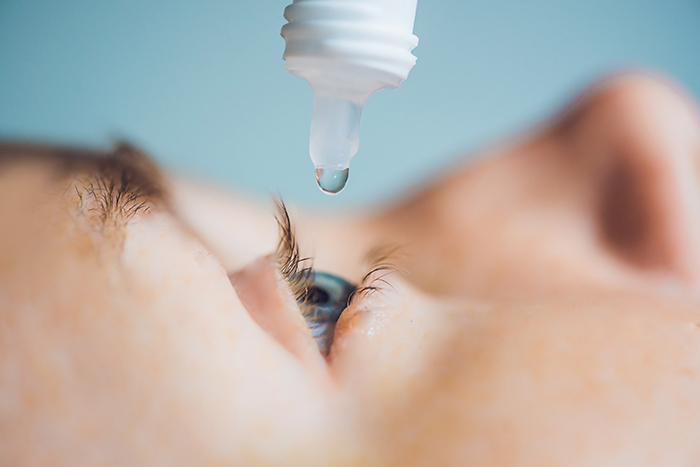Help and Hope for Dry Eye Sufferers

No one wants to view life through red, burning, scratchy eyes, but plenty of us do. According to the American Academy of Ophthalmology, nearly five million Americans struggle with dry eye syndrome. Others believe they have it, but actually have a different issue with similar symptoms. The disease confuses patients and health care professionals alike.
“From allergies and aging to eyelid problems like blepharitis – the list of conditions that mimic dry eye is almost endless. That’s why proper medical care and follow-up exams are so important,” says Dr. Allister Gibbons, an ophthalmologist at Bascom Palmer Eye Institute, part of the University of Miami Health System.
Recognizing the symptoms
Despite its simple name, the syndrome can present multiple symptoms, including:
- Pain, burning or scratchy sensation
- Thin, string-like mucus
- Sensitivity to light
- Redness
- Feeling like you have a foreign object in your eye
- Difficulty wearing contact lenses
- Difficulty with night driving
- Watery eyes
- Blurred vision or eye fatigue
Causes and concerns
Simply stated, dry eye syndrome occurs when your eyes don’t produce enough tears or the right quality of tears. The quality aspect is especially confusing. “Patients don’t understand how they can have dry eye if their eyes are constantly tearing, but now we know that tear quality issues are the more common form of the disease. Recent medical attention has focused more on this issue so we can diagnose and treat it more effectively,” Dr. Gibbons says. Some patients experience dry eyes after undergoing a LASIK vision correction procedure. “LASIK can damage surface cells that create mucus and moisture in the eyes. It may also sever nerves that signal the brain to send tears to the eyes,” Dr. Gibbons explains.
Sjogrens disease, an immune disorder accompanied by dry eyes and a dry mouth, is another related condition. It is frequently found in people with rheumatoid arthritis or lupus.
According to a study Bascom Palmer ophthalmologists Dr. Anat Galor and Dr. Naresh Kumar contributed to, dry eye also seems connected with a variety of other causes. These include:
- Allergies, pollen count and allergy medications
- Depression, anxiety and related medications
- Evaporative issues
- Environmental stressors on the surface of the eye, including dust, wind, pollution and mold
The study found that dry eye symptoms were more prevalent in spring and fall, coinciding with peak allergy seasons and weather fluctuations. And Miami had roughly four times higher variability in doctor visits for dry eye throughout the year than the rest of the U.S.
Finding answers
To deal with this irritating eye issue, you need an accurate diagnosis. “Before scheduling your eye exam, ask if the doctor specializes in treating patients with dry eye. Often, patients are just told to use artificial tears, which may not help,” Dr. Gibbons explains.
There is hope on the horizon. Ocular surface centers are opening around the nation, including one at Bascom Palmer’s Plantation campus. “These centers offer advanced diagnostic and treatment techniques,” Dr. Gibbons explains.
Medications are also improving. “Inflammation plays a critical role in dry eye. We used to treat the problem with steroids, but those have side effects. Recently, the FDA approved medications which target inflammation without steroidal side effects.”
When to seek help
People with chronically dry eyes have a greater risk of infection, abrasions and thinning corneas. If your eyes always seem irritated, inflamed or dry, see an ophthalmologist. If your vision is trouble-free and you have no family history of eye disease, the American Academy of Ophthalmology recommends seeing an eye doctor at age 40, and every two to three years thereafter. At age 65-plus, you should schedule a visual exam every one to two years.
Self-care tips
In addition to your doctor’s advice, the following tips help relieve dry eye symptoms:
- Limit your screen time
- Quit smoking
- Get sufficient sleep
- Take flax seed oil and omega-3 supplements*
- Place hot, moist compresses on your eyes
- Give your eyes a break from contact lenses
- Wear sunglasses outside
- Avoid using ceiling fans
- Use a humidifier in your bedroom or house
- Install a high quality air filter to help minimize mold, dust and other environmental stressors
*Consult your doctor before starting any supplement or OTC medication.
To schedule an appointment at Bascom Palmer’s Ocular Surface Center, call 954-465-2700 or click here.
Nancy Moreland is a contributing writer for UMiami Health News. She has written for several major health care systems and the Centers for Disease Control and Prevention. Her writing also appears in the Chicago Tribune.
Tags: Bascom Palmer Eye Institute, Dr. Allister Gibbons, dry eye, Miami ophthalmology
